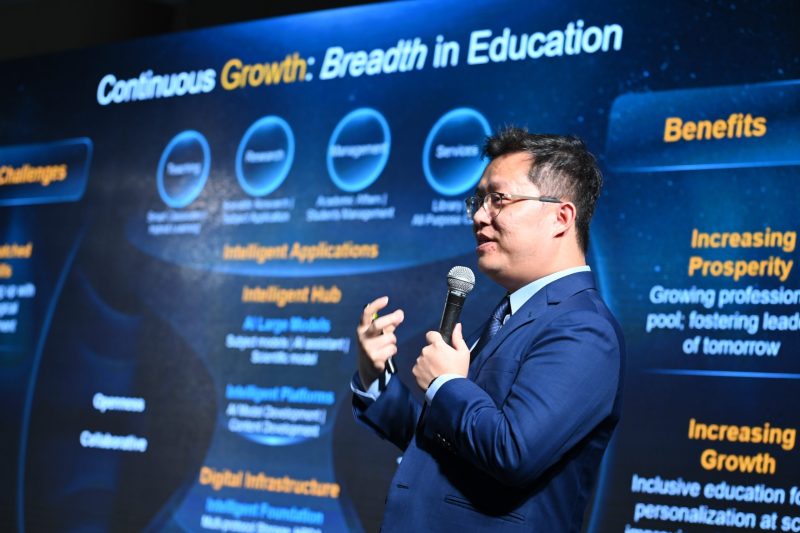In the current digital era, smart technologies are changing people’s quality of life, working processes, and the ways in which we connect. As the world becomes increasingly more digital, several sectors are shifting their focus to ‘Smart Cities’ and smart city concepts. A ‘Smart City’ integrates various smart technologies synergistically to enhance efficiency in managing and utilizing urban resources, ultimately elevating the overall quality of life for its residents. This can be achieved by seamlessly leveraging technologies such as Machine Learning, Artificial Intelligence (AI), the Internet of Things (IoT), and more. Smart Cities can become a new paradigm to address current living challenges, enabling people to enjoy an improved quality of life despite factors like environmental change, disease outbreaks, unpredictable criminal activities, and traffic issues like those seen in Thailand. Huawei Technologies (Thailand) Co., Ltd., a leader in information and communication technology (ICT) infrastructure that is helping to accelerate digital transformation in Thailand, aims to support Thai citizens in utilizing state-of-the-art technologies to push for the actualization of technology adoption and Thailand’s transformation into a Smart City hub in Asia.
Huawei, in collaboration with the Digital Economy Promotion Agency (depa), recently collaborated to host the ‘Thailand Smart City 2023’ seminar under the theme ‘Accelerating Intelligence of Smart City: to enhance the quality of life’, bringing together industry experts and leaders to share knowledge and trends while showcasing tangible innovations, technologies, and strategies that are driving digital transformation in smart cities.
Mr. Sheldon Wang, Vice President of Enterprise Business Group, Huawei Technologies Thailand, emphasized Huawei’s approach to Smart City innovation at the Thailand Smart City 2023 event: “When we talk about a Smart City, we mean the integration of various technologies. For Huawei, we categorize technologies into three major groups: 1) Cloud Computing, enabling comprehensive city-wide accessibility through cloud systems; 2) Smart Connectivity, allowing the City Backbone to connect to diverse technologies and work seamlessly together; and 3) Intelligent Operation Centers, overseeing systematic management and assisting city residents in their daily lives.”
Huawei prioritizes security as one of its top concerns. As such, the company strongly focuses on the sustainable growth of the social economy as well as enhancing the overall quality of life and education for urban populations. To ensure technological safety within the city, Huawei employs Intelligent Sensors, including 5G systems, IoT devices, and a robust industry-supported infrastructure. These elements contribute to achieving standard Emergency Response Times, facilitating rapid responses to incidents by integrating closed-circuit television (CCTV) cameras and IoT devices connected via Wi-Fi to control centers. In case of emergencies, relevant authorities promptly employ Real-Time Monitoring systems to initiate rapid responses.
Mr. Prayut Tangsombat, CTO of Network Technology, Enterprise Business Group, Huawei Technologies (Thailand) Co., Ltd., highlighted Thailand’s technological progress: “We have the most advanced 5G system in Asia, allowing us to comprehensively gather data for the Government Data Center and Cloud Service (GDCC) project. Moreover, we have AI Unique Thailand, an AI Computing system tailored to understand the Thai language and its people, with specialized AI applications created for government use, including weather forecasting. As we progress toward Smart City development, we aim to establish connectivity across all points in Thailand through 5G signals, extending even to remote villages and outskirts through microwave technology. Our AI technology enables the creation of a virtual global community (Metaverse), providing insights from the city’s surface to underground pipelines. This allows administrators to access all data and stay informed about city-related events or issues, such as preparing for or evacuating in the event of an approaching storm.”
Huawei’s commitment to Smart City security embodies the concept of Omni Safety, integrating data from communication systems across organizations in Thailand. This seamless integration ensures that during emergencies like a gas explosion, where people usually report incidents to hospitals and police stations using their phones and based on personal judgments, Smart City innovations would instead gather and send all relevant information to the city’s brain, or the Intelligent Operation Center, which serves as the smart city’s control system that effectively monitors and consolidates data to facilitate a systematic and swift response. The center is equipped with a centralized system that will alert relevant authorities and agencies to promptly intervene in certain scenarios or mitigate potential disasters. In addition, Smart CCTV cameras (Intelligent Vision) quickly understand the visual content and play a crucial role in promptly notifying officials.
Practical and data-driven technologies with real-world applications are a key component in advancing society and enhancing the quality of life for humanity. Huawei actively supports and advocates for the evolution of Smart Cities and rapid digital transformation in Thailand, with the aim of progressing towards an intelligent public service system accessible across the entire nation and improving both the convenience and standard of living for Thai people. This commitment aligns with Huawei’s mission to ‘Grow in Thailand, Contribute to Thailand’, pushing for sustainable growth and collaboration with sector partners to transform Thailand into a future digital and Smart City hub in ASEAN.
